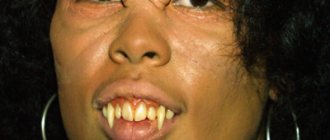A phobia with a name that is difficult to pronounce seems frivolous to those who do not feel any emotions in relation to the number 666. Moreover, it is not included in the list of official phobias, and is perceived by medicine as far-fetched. However, this does not make life easier for those who panic at the sight of this combination of numbers.
Fear of the number 666 is one of the unofficial but harmful phobias
First, you should find out what the fear of the number 666 is called. The name of the disease is difficult to pronounce; in science, the fear of the number 666 is called hexakosioihexekontahexaphobia - this is “six hundred sixty-six” translated from the Greek spelling of the number with the words “hexakosioi hexekonta hex” or “hexakosioi hexēkonta hex”.
What is the fear of the number 666 called?
Hexakosioihexekontahexaphobia is the fear of the number 666. Translated from ancient Greek hexakosioi hexēkonta hex - six hundred sixty six. Fear is inherent in people who associate themselves with Christianity. In the Bible, under the number 666, the name of the beast of the Apocalypse is hidden, mentioned several times. In fact, at the time when the New Testament and in particular the Revelation of St. John was written, the number six hundred sixty-six did not look like three sixes, because the decimal number system appeared much later. Nevertheless, it is “666” that strikes fear into some modern people suffering from hexakosiohexekontahexaphobia.
There is an opinion that the beast of the Apocalypse, described in the New Testament, symbolizes the Antichrist, the protege of Satan. Thus, a trail of evil power was finally attached to the number.
Ekbom's syndrome (Dermatozoan delirium)
Ekbom syndrome is a delusion of parasite infestation. The patient believes that insects, lice, maggots, or other small parasites live under his skin, on his skin, or somewhere in his body.
Manifestations of the syndrome were described in 1937 by the Swedish neurologist Karl-Axel Ekbom. This condition was probably first described by French dermatologists in the 1890s. In 1920 Terms such as zoophobia, parasitophobia and acarophobia were used to denote the condition.
This condition may occur in combination with other psychiatric symptoms or as an isolated phenomenon. In modern classification systems, it is classified as delusional disorders (ICD-10, ICD-11), delusional disorders of the somatic type (DSM-4-TR, DSM-5).
Causes of phobia
The fear of the number 666 is nothing more than a religious prejudice, of which there are many. People often tend to think in stereotypes, to absorb the knowledge of previous generations uncritically, simply on faith. This contributes to the formation of a lot of stereotypes, prejudices and superstitions. Despite the fact that the roots of the fear of the number 666 lie in a religious plane, not only Christians, but also any suspicious individuals can suffer from a phobia.
Anxiety itself can be caused by anything, and fear of three sixes is just a way to control the situation. I noticed the “sign” - forewarned, which means forearmed.
It is worth noting that hexakosiohexekontahexaphobia may be a symptom of developing obsessive-compulsive disorder. If a person begins to closely examine any numbers he encounters: car license plates, numbers on travel coupons, receipts, and noticing a “terrible” combination, experiences negative emotions, fear, anxiety, and performs “saving” rituals – then this is a serious reason to think. Among other things, a pathological irrational reaction to 666 may be part of a schizophrenic delusion, therefore, when diagnosing a phobia, it is important to exclude more serious mental disorders.
Recommendations from professionals
There are simple recommendations from psychologists to stop being afraid of the mystical number. Below we will consider an approximate treatment option for unadvanced cases.
- Find something you like, distract yourself from obsessive thoughts. Do not discuss the topic of the apocalypse with other people.
- Try to keep your emotions under control and be positive.
- Familiarize yourself with scientific information about the subject of your phobia, but don't get too carried away - there is a risk of becoming fixated on the topic again.
- The patient's social circle is also important - cheerful, friendly people will help you get into the right frame of mind and forget about the phobia.
- Practice meditation, read psychological literature.
If you cannot cure a phobia on your own, you will have to seek help from a specialist. Don't let the disease get worse, otherwise it can develop into a serious mental illness. People with existing mental problems are at risk. If you know you have a tendency to be overly sensitive, avoid topics that are “dangerous” for yourself.
Symptoms and signs
Phobia of the number 666 is characterized by irrational fear and avoidance behavior. Your heart rate may increase and your palms may sweat. A person suffering from a phobia tends to pay attention to numbers in general and change his route and plans if he notices three sixes. The psyche helps to isolate the most negative ones from a series of events and remember them. Thus, a fixation occurs: I saw 666 - trouble happened . At the same time, all events that do not fit into the concept are swept aside and forgotten.
Severe symptoms suggest an increase in general anxiety and levels of aggression. Panic attacks, sudden tears, and dizziness occur. Fear grips a person so much that it prevents him from functioning calmly in the world, depression may develop, and social avoidance occurs.
Biological factors
MRI studies have shown that patients with Ecobom Syndrome are characterized by several features, including: thickening of the orbitofrontal cortex of the right hemisphere; reduction in the area of the orbitofrontal cortex and the occipitotemporal medial gyrus of the right hemisphere; smoothing the relief of the ascending frontal gyrus of the left hemisphere, the inferior parietal, middle temporal and ascending frontal gyri of the right hemisphere.
The ascending frontal gyrus is known to be responsible for response inhibition. It can be assumed that the smoothing of the relief in this area of the cortex leads to a worsening of the inhibition of motor reactions. This may be a neurobiological mechanism that causes self-harm, such as skin damage when trying to get rid of pathogens.
The postcentral gyrus region contains the primary somatosensory cortex, which is involved in proprioception, thermoception, and nociception. Changes in the somatosensory cortex may explain disturbances in body perception and proprioception, leading to unbearable itching attributed to pathogens crawling under the skin. Consistent with this is the finding that in patients with dermatozoal delirium, the long gyrus of the insula exhibits an enhanced response to stimuli associated with infection.
In addition, patients experience increased activity in the amygdala, which plays a fundamental role in states of anxiety or fear. It is hypothesized that disruption of the connection between the long gyrus of the insula and the amygdala may be responsible for an altered interpretation of skin sensations that is reinforced in the amygdala. This error at the neural level starts the process of development of dermatozoal delirium.
Disturbed cortical relief may be a neurodevelopmental marker of various psychotic syndromes. Changes in relief are observed in the parietal areas. The inferior parietal lobule is involved in processes associated with attention, inhibition, self-perception, and interpretation of sensory data. Structural changes in this area may be one of the causes of abnormal perception of one's own body in patients with dermatozoal delirium.
Is it normal to be afraid of the number 666?
The concept of normal is very relative, so there is no point in seriously discussing whether it is normal to be afraid of the number 666. Fear is a necessary feeling because it has a protective function. Is it worth defending against three sixes? Of course not. If you have 6 rubles 66 kopecks left in your account, this is unlikely to be the machinations of Satan. Perhaps someone will disagree with this. I would like to note that many who are afraid may not even know where this superstition comes from, they have heard that the number is associated with the devil and that’s all.
The desire for order in obsessive states
With obsessive-compulsive disorder, in a third of cases, compulsions are observed, which are characterized by a desire for a symmetrical distribution of objects and the establishment of a certain order. Moreover, the desire for a symmetrical arrangement of objects is more common than the desire to restore order.
Very often, the desire to place objects in a certain order is often combined with an obsessive desire to count surrounding things or objects.
In Egypt, according to statistical psychiatric studies, obsessions associated with symmetry are observed in 43% of cases, and compulsions, characterized by a desire to restore order, in 50% of cases of obsessive-compulsive disorder.
Very often these compulsions are observed in adolescents and children. But even in healthy children, one can find a desire for symmetry, structure, and order.
The desire for symmetry, as a type of compulsion, is most likely associated with the need to “do everything right,” which reduces anxiety and increases control over internal and external certainty
Such inclinations as the desire for order, neatness, completeness, symmetrical, correct arrangement of objects are one order of obsessive compulsive states that are similar in their source. In these states, the leading role is played by the need to count or take into account things or objects.
Among ancient peoples and among children one can also find a desire to arrange objects symmetrically, or proportionally. In this regard, the idea arises that such needs are associated with either a magical or figurative type of thinking, and that this may be an integral stage in the ontogenesis or phylogenesis of the human psyche.
Organizing objects can be a defense against potential threat, punishment, or danger. At the same time, intuition tells the patient what to do in order to be protected, and the feeling of danger is caused by internal anxiety, which is complemented by very high demands on oneself.
At the same time, pedantry and accuracy become a kind of indicator to others and to oneself that everything is perfect, has a finished look, ideal. Often, when arranging objects, patients may praise themselves using established phrases. They may become irritated with loved ones or family members when they enter the room, rearrange things or touch objects. Very often, the desire for order and symmetry is manifested in checking whether all household items or documents are located correctly, a feeling of comfort when the patient hears a smooth, weak, monotonous noise. A manifestation of the desire for symmetry and order can be uniform tapping of fingers, stroking objects, the desire to perform absolutely identical movements with the left and right hands.
Thus, an obsessive state characterized by a desire for symmetry requires treatment, which can be carried out in the clinic of Doctor of Medical Sciences V.L. A minute in Moscow.
How to overcome fear
To get rid of the fear of the number 666, you need to figure out what exactly is scary. Perhaps the person is hiding behind this strange phobia some deep emotional experiences, an unresolved intrapersonal conflict. The fear of three sixes only distracts him from serious problems. In this case, you need to seek qualified help from a psychologist.
In addition, it is important to improve your educational level, learn to think broadly, and not resort to standard schemes and templates. Even if you are a very impressionable person and watching a movie can disturb your psyche, overcome yourself, check the information, take an interest in science.
It is useful to read different literature and communicate with educated people. Ultimately, have hobbies that will occupy your thoughts and distract you from obsessively staring at numbers.
Adviсe
Experts have developed a number of recommendations that can help you quickly get rid of fear. To make the fear go away, you need to follow the rules:
- A large number of cases does not allow fear to arise. When there is no time for thinking and reasoning, a person is less susceptible to phobias. Discussing the number 666 with friends and acquaintances should be prohibited.
- Learning to manage your mood should be another habit for those struggling with a phobia. Psychologists advise looking for more positive moments in life and smiling more often.
- It’s better not to read anything about hexakosiohexekontagexaphobia. Evidence of the existence, reasons for the occurrence of fear only intensifies the fear.
- Communication with positive people who are ready to support at any moment helps to get rid of the feeling of fear. A close circle can inspire hope and success.
- Reading literature about self-development, self-improvement, and managing emotions is another way to overcome your fear of numbers.
Please note that if you cannot get rid of exciting thoughts or panicky horror of a combination of sixes on your own, then you need to immediately consult a doctor. Over time, the scale of the phobia increases, in some cases it leads to suicidal tendencies. You shouldn’t risk being left without specialist care.
Known Facts
The number of the beast is extremely popular among heavy metal musicians. It is difficult to list songs in which, one way or another, the number 666 or a hint of it is present. Satanism is an attractive worldview for young people, especially its external attributes. And three sixes are tightly included in this list, along with an inverted pentagram.
An interesting fact is that the gambling game “roulette” is also called the “Ferris wheel” not only for its properties, but also because the sum of all numbers is 666.
June 6, 2006, when the abbreviated date entry looked like 06/06/06. Many people were excited, both Christians and Satanists. The former organized round-the-clock prayers in order to avoid the triumph of evil forces, while the latter, in order to annoy the former, organized a celebration of the 40th anniversary of the founding of the Church of Satan.
Some deeply religious people expressed dissatisfaction and even influenced changes in the numbers of transport routes.
Interesting facts about the number 666 and why some people may be afraid of it are explained in this video:
Delirium of bad smell
Patients with Ekbom Syndrome sometimes have delusions that they are the source of a bad odor. They think that a bad odor comes from the mouth or anus. This belief is reinforced by an incorrect interpretation of the behavior of people around them, who allegedly show disgust or avoid communication with the patient. Patients insist that the unpleasant odor is due to intestinal gases, and therefore demand that they be referred to a gastroenterologist, or the odor is explained by abnormalities in sweating, and therefore demand that they be referred to a dermatologist.
A significant proportion of patients complain of bad breath, for this reason they are often referred to a dentist or otolaryngologist. A small number of patients appear to develop olfactory hallucinations because they are able to describe the smell in detail. This condition is called “hallucinatory halitosis” and “olfactory reference syndrome.”
There is no doubt that patients do experience great suffering. Their condition does not improve after dental treatment and sometimes, although rarely, they suffer from depression and even try to commit suicide.
Psychodynamic factors
From a psychodynamic point of view, two important aspects of dermatozoal delusions are guilt and projection. A strange thing about dermatozoal delirium is that it is more common in women, while body dysmorphic disorder is more common in men. This is probably due to the fact that the form in which hypochondria manifests itself depends on gender role. One might assume that women who have experienced an unwanted pregnancy, or are ashamed of losing their virginity, or have had sexually transmitted infections feel that their body has been “contaminated.” On the other hand, men with body dysmorphic disorder believe that their perceived ugliness prevents them from achieving social and sexual success.
Paranoid psychoses are usually conceptualized as projections of the patient's feelings into the external world, from where they return to him and make him believe that other people are tormenting and persecuting him, or, in the case of manic states, the reflected projections give rise to a sense of his own grandeur. In Cotard's Syndrome with nihilistic delusions of death, the patient becomes his own accuser and executioner. Imaginary lice, fleas, etc. can be a symbol of condemning oneself for uncleanness, which is in one way or another connected with sex.










